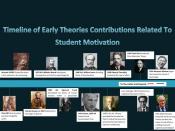WORKING WITH PEOPLE AND TEAMS
ASSESSMENT
OUTCOME 2
Buck and Huck defines the concept of motivation by saying, "motives are learned needs which influence our behaviour by leading us to pursue particular goals because they are socially valued" . Motivation strategy can be defined as a plan or design to define motivational goals.
The doctrine that human nature is rational-economic derives ultimately from the philosophy of hedonism, which argued that people act to maximise their self-interest.
In terms of employee behaviour, this general line of thought led to the assumptions that, employees are primarily motivated by economic incentives and will do whatever affords them the greatest economic gain. Since economic incentives are under the control of the organisation, the employee is essentially a passive agent to be manipulated, motivated and controlled by the organisation. Feelings are, by definition, irrational and therefore, must be prevented from interfering with a person's rational calculation of self-interest.
Organisations can and must be designed in such a way as to neutralise and control people's feelings and therefore, their unpredictable traits.
In addition, assumptions were also made that people are inherently lazy and must, therefore, be motivated by outside incentives. People's natural goals run counter to those of the organisation; hence they must be controlled by external forces to ensure that they work toward organisational goals. Because of their irrational feelings, people are basically incapable of self-discipline and self-control.
People can, however, be divided roughly into two groups; those who fit the assumptions outlined above and those who are self-motivated, self-controlled and less dominated by their feelings.
The organisation is buying the services and obedience of the employee for economic rewards and the organisation assumes the obligation or protecting itself and the employee from the irrational side of his or her nature via a system of...


